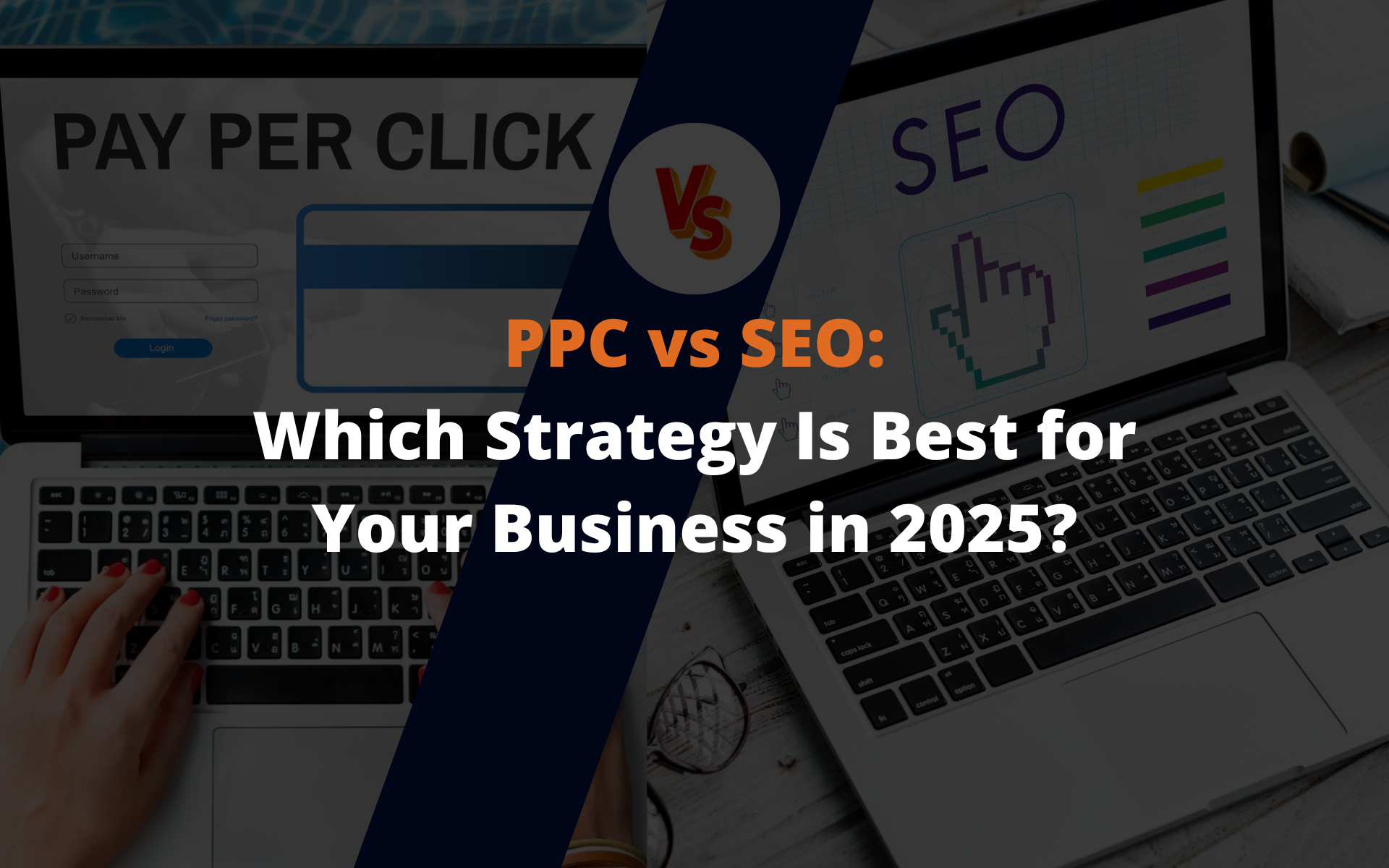PPC vs SEO
In the digital world, businesses have many ways to reach their audience. Two of the most popular methods are Search Engine Optimization (SEO) and Pay-Per-Click (PPC) advertising.
Therefore, understanding these strategies is crucial for important growth in 2025. This blog post will explore the differences between PPC vs SEO, their pros and cons, and how to choose the best strategy for your business.
What is SEO?
SEO stands for Search Engine Optimization. It is a method used to improve a website's visibility on search engines like Google. The goal of SEO is to get more organic (free) traffic to your site.
Key components of SEO include:
- Keywords: Words or phrases that people search for.
- Content: Quality information that answers users' questions.
- Backlinks: Links from other websites that point to your site.
Businesses that should prioritize SEO include e-commerce, real estate, healthcare, and local services, as they benefit from increased organic visibility and long-term growth.
What is PPC?
PPC stands for Pay-Per-Click advertising. It is a model where businesses pay each time someone clicks on their ad. This means you can buy visits to your site instead of earning them organically.
How PPC works:
- Advertisers offer on keywords.
- Ads appear at the top of search results.
- You pay only when someone clicks on your ad.
Businesses that need PPC are those requiring immediate results, such as new product launches, competitive industries, or seasonal promotions, where quick visibility and traffic are essential.
Differences Between PPC and SEO
PPC and SEO are two popular strategies for driving traffic to websites. While they share the goal of increasing visibility, they differ significantly in approach, cost, timing, and benefits. So, below is a detailed about PPC vs SEO to help businesses understand their key differences.
|
Aspect |
SEO |
PPC |
|
Definition |
SEO focuses on optimizing your website to rank organically in search results. |
PPC involves paying for ads that appear at the top of search results or on other platforms. |
|
Cost |
No direct cost for clicks; investment is required for content creation and optimization. |
Charged per ad click; costs vary depending on competition for keywords. |
|
Placement |
Appears below paid ads in search results (organic listings). |
Ads appear above organic search results, ensuring immediate visibility. |
|
Timing |
Long-term strategy; results typically take 3-6 months or longer. |
Short-term strategy; delivers immediate traffic once campaigns are live. |
|
Budget Flexibility |
Fixed costs for creating and maintaining content; scalable over time. |
Variable costs; businesses can control daily budgets and pause campaigns anytime. |
|
Performance Tracking |
Requires long-term tracking of organic traffic growth and rankings. |
Provides instant metrics like clicks, impressions, and conversions for real-time adjustments. |
|
Audience Targeting |
Targets users based on keywords and search intent. |
Allows precise targeting using demographics, location, and behaviors. |
|
Sustainability |
Builds lasting authority and trust with users through organic rankings. |
Traffic stops when ad campaigns end; requires continuous spending to maintain visibility. |
|
Best Use Cases |
Ideal for long-term branding, authority building, and nurturing leads. |
Perfect for quick promotions, new product launches, or competitive niches. |
Advantages of SEO
- SEO generates organic traffic without ongoing ad spend once established.
- High rankings can sustain visibility over time, providing ongoing traffic.
- Users trust organic search results more than paid ads, increasing brand authority.
- Optimized content attracts more visitors and improves engagement.
- Over time, SEO often delivers a higher return on investment compared to PPC.
- SEO focuses on users actively searching for your products or services.
- SEO practices increase website usability, leading to higher satisfaction.
- Higher search rankings increase visibility, making your brand more recognizable.
- Effective SEO can help you outrank competitors in search results.
- SEO strategies can evolve with market trends and algorithm updates.
Disadvantages of SEO
- SEO requires significant time and effort to see results, often taking several months.
- Frequent updates to search engine algorithms can negatively impact rankings unexpectedly.
- Continuous optimization and content updates are necessary to maintain and improve rankings.
- Competing for popular keywords can be challenging, especially in saturated markets.
- SEO results can fluctuate due to various factors, making it hard to guarantee consistent traffic.
- Requires upfront investment in quality content and technical improvements before seeing benefits.
- Businesses have less control over search engine results compared to paid advertising options.
- The return on investment can take longer compared to PPC, which delivers immediate traffic.
Advantages of PPC
- PPC ads appear at the top of search results, providing instant exposure to your business.
- You can precisely target specific demographics, locations, and interests to reach your ideal audience.
- Set daily or monthly budgets and adjust spending based on performance and business needs.
- Access real-time data and analytics to track clicks, conversions, and ROI effectively.
- Quickly modify or pause campaigns to respond to market changes or optimize performance.
- Even if users don’t click, seeing your brand at the top of search results increases recognition.
- Easily test different ad copies, keywords, and landing pages to find the most effective combinations.
- Ideal for launching time-sensitive offers or promotions with immediate impact.
- Works well alongside SEO efforts to maximize visibility in both organic and paid search results.
- Target users actively searching for products or services, increasing the likelihood of conversions.
Disadvantages of PPC
- Ongoing payments are necessary to maintain traffic and visibility.
- Competitive keywords can lead to expensive click costs and straining budgets.
- Once the campaign ends, traffic ceases, requiring constant funding for ongoing visibility.
- Many users prefer organic results and may distrust paid advertisements.
- Users may become desensitized to ads over time, reducing click-through rates.
- Requires constant monitoring and optimization to ensure effective performance.
- Unlike SEO, PPC does not build lasting authority or organic traffic over time.
Therefore, both PPC and SEO have unique strengths and weaknesses. While SEO offers long-term benefits at a lower cost, PPC provides immediate traffic but requires continuous spending.
However, for businesses in 2025, understanding PPC vs SEO is essential for making informed decisions about digital marketing strategies.
Are you starting a new business or looking to increase your existing one? WOWinfotech is here to help you rank higher in competitive markets with our expert SEO and PPC services. Our strategies will improve your online visibility, drive targeted traffic, and maximize your return on investment. Contact us at +919370104077 or email us at info@wowinfotech.com. With a focus on both immediate results through PPC and sustainable growth via SEO, we ensure that your business stands out.
FAQ’S
1. What is PPC in digital marketing?
PPC (Pay-Per-Click) is an online advertising model where businesses pay a fee each time their ad is clicked, helping drive targeted traffic quickly.
2. What is a PPC campaign?
A PPC campaign is a structured online advertising strategy where businesses create and manage ads on platforms like Google Ads to attract potential customers.
3. What is SEO in digital marketing?
SEO (Search Engine Optimization) is the process of improving a website’s visibility on search engines through organic strategies like keyword optimization and quality content.
4. Is SEO better than PPC?
SEO provides long-term organic traffic, while PPC delivers instant results; the best choice depends on your goals, budget, and business needs.
-

Krishna Handge
WOWinfotech
Mar 25,2025
